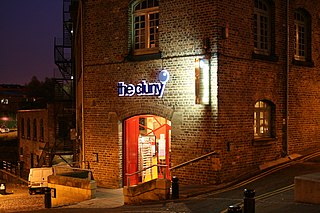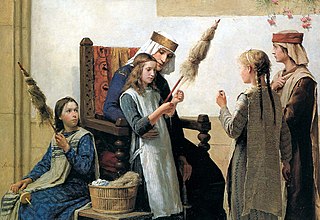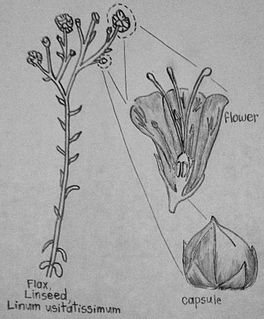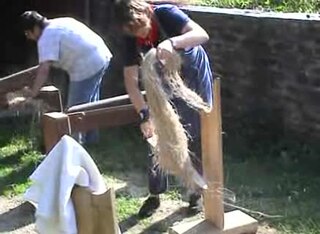 W
WFlax, also known as common flax or linseed, is a flowering plant, Linum usitatissimum, in the family Linaceae. It is cultivated as a food and fiber crop in regions of the world with temperate climates. Textiles made from flax are known in Western countries as linen and are traditionally used for bed sheets, underclothes, and table linen. Its oil is known as linseed oil. In addition to referring to the plant, the word "flax" may refer to the unspun fibers of the flax plant. The plant species is known only as a cultivated plant and appears to have been domesticated just once from the wild species Linum bienne, called pale flax. The plants "flax" in New Zealand are, by contrast, members of the genus Phormium.
 W
WThe Cluny is a 300-capacity live music venue, pub and café, on Lime Street, in the Ouseburn Valley area of Newcastle upon Tyne, England. Based in a former flax spinning mill, The Cluny occupies part of the wider building at 36 Lime Street, sharing the space with artists, offices and recording studios. The Cluny is a regular fixture in the top 100 list of World's Best Bars, and is currently the only pub in Newcastle upon Tyne to make the list.
 W
WA distaff is a tool used in spinning. It is designed to hold the unspun fibers, keeping them untangled and thus easing the spinning process. It is most commonly used to hold flax, and sometimes wool, but can be used for any type of fiber. Fiber is wrapped around the distaff, and tied in place with a piece of ribbon or string. The word comes from dis in Low German, meaning a bunch of flax, connected with staff.
 W
WFlax mills are mills which process flax. The earliest mills were developed for spinning yarn for the linen industry.
 W
WThe production of flax and other oilseed crops peak in the temperate climates of the middle mountain and hill farming regions in Nepal. Flax matures in approximately 90 to 125 days and develops most rapidly under the cool, short season of growing. The middle hill region of the Lamjung district exemplifies an ideal climate for flax production experiencing consistently cool temperatures for most of the year. The shallow rooting system makes the plant especially susceptible to drought and excess moisture in the soil but easier to harvest. Most cash crops are grown in the hill regions of Nepal as this is where two-thirds of the subsistence farmers reside, who need to produce just enough food to feed themselves and their families.
 W
W"Frau Holle" is a German fairy tale collected by the Brothers Grimm in Children's and Household Tales in 1812. It is of Aarne-Thompson type 480.
 W
WHeckling is the last of three steps in dressing flax, or preparing the fibers to be spun. It splits and straightens the flax fibers, as well as removes the fibrous core and impurities. Flax is pulled through heckling combs, which parts the locked fibers and makes them straight, clean, and ready to spin. After heckling and spinning, flax is ready to be woven into linen.
 W
WLincrusta is a deeply embossed wallcovering, invented by Frederick Walton. Walton was already known for patenting linoleum floor covering in 1860. Lincrusta was launched in 1877 and was used in a host of applications from royal homes to railway carriages. Many examples over a hundred years old can still be found throughout the world.
 W
WLinen is a textile made from the fibers of the flax plant.
 W
WLinseed oil, also known as flaxseed oil or flax oil, is a colourless to yellowish oil obtained from the dried, ripened seeds of the flax plant. The oil is obtained by pressing, sometimes followed by solvent extraction. Linseed oil is a drying oil, meaning it can polymerize into a solid form. Owing to its polymer-forming properties, linseed oil can be used on its own or blended with combinations of other oils, resins or solvents as an impregnator, drying oil finish or varnish in wood finishing, as a pigment binder in oil paints, as a plasticizer and hardener in putty, and in the manufacture of linoleum. Linseed oil use has declined over the past several decades with increased availability of synthetic alkyd resins—which function similarly but resist yellowing.
 W
WLinum strictum, commonly known as rigid flax, upright flax, and upright yellow flax, is a species of flax that has a rigid stem, from whence it derives its taxonomic name, growing to a height of 10–45 cm. The plant is endemic to the Mediterranean region, and features highly in classical Hebrew and Greek literature, owing principally to its cultivation for its plant fiber, linen, but also for its edible seeds and culinary foliage.
 W
WNewmills Corn and Flax Mills is a grain mill located in County Donegal, Ireland. The mill is situated on the R250, Churchill road, beside Newmills Bridge on the south bank of the River Swilly, 5 kilometres west of Letterkenny in the small town of Milltown. It features one of the largest operating waterwheels in the country. The millrace is 1 km long and powers two separate millheels, one for grinding oats and barley and the other for flax.
 W
WResearch Plot 30, is a historic agriculture site on the North Dakota State University campus in Fargo, North Dakota. When the pioneers broke up the grass prairie sod, flax was usually one of the first crops sown. If flax was sown continuously or with short rotations between subsequent flax crops, the flax became diseased and was called "flax sick" by farmers. The symptoms were wilting and dying flax plants during the growing season. The site is located near Centennial Avenue and 18th Street North. Flax was first planted at the site in 1894 by Professor Henry L. Bolley, a noted researcher in flax botany. By 1900, the flax plants were dead or dying. Bolley identified flax pathogens introduced by the plants themselves as the cause, and further identified resistant plants. Flax breeding programs from all over the world have sent material to NDSU to be tested for resistance to flax wilt in Plot 30.
 W
WThe Round was a theatre-in-the-round in the Ouseburn Valley, Newcastle upon Tyne, England. The region's first theatre-in-the-round, it specialised in theatre for children and young people. The Round opened in September 2007, and was home to the Bruvvers Theatre Company.
 W
WScutching is a step in the processing of cotton or the dressing of flax or hemp in preparation for spinning. The scutching process separates the impurities from the raw material, such as the seeds from raw cotton or the straw and woody stem from flax fibers. Scutching can be done by hand or by a machine known as a scutcher. Hand scutching of flax is done with a wooden scutching knife and a small iron scraper. The end products of scutching flax are the long finer flax fibers called line, short coarser fibers called tow, and waste woody matter called shives.
 W
WTemple Works is a former flax mill in Holbeck, Leeds, West Yorkshire, England. It was designed by engineer James Combe a former pupil of John Rennie, David Roberts, architect Joseph Bonomi the Younger and built in the Egyptian Revival style by John Marshall between 1836 and 1840 with a 240 hp double beam engine by Benjamin Hick. Temple Works is the only Grade I listed building in Holbeck.
 W
W"The Three Spinners" is a German fairy tale collected by the Brothers Grimm in Grimm's Fairy Tales. It is Aarne–Thompson type 501, which is widespread throughout Europe.